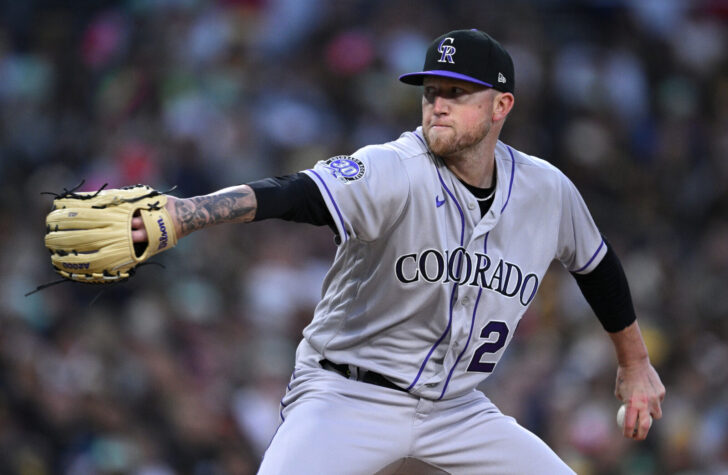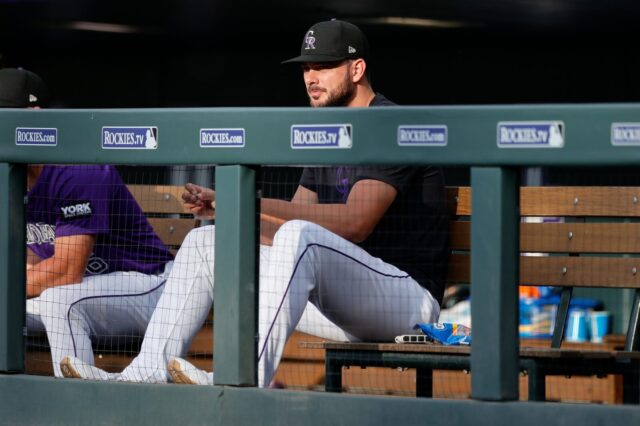Strike 1: The perils of pitching a mile above sea level have been well documented over the past three decades. The altitude has been cited by many pitchers – and not just opponents – as being the reason they didn’t fare well here. There’s factual basis to support the added difficulty of making a slider slide exactly right at Coors Field, but more often than not – at least in the eyes of men like Colorado Rockies manager Bud Black, the altitude has been used as a crutch far more than it should be.
There’s one notable exception to that tendency to complain, however: Pitchers who have grown up or grown accustomed to throwing their best stuff at 5,280 feet. The local guys.
Those of us who grew up here have always had Colorado’s altitude as a baseline. The way you’re breaking ball moved here was your normal. We didn’t know any better. And when the time came to move down to lower altitudes and even sea level, we had to back off somewhat and contain that extra movement on our pitches.
That was, and is, the easier adjustment.
So what we never have had is fear of altitude. Why would we be fearful of normal?
With that in mind, the Colorado Rockies – and Black in particular – are doing their utmost to stock the Rockies roster with home grown pitchers. And more are on the way.
Kyle Freeland is already a standout starter for his hometown team. Last season, management brought in relief pitchers Lucas Gilbreath and Ty Blach, both local high school products, to help the bullpen. This offseason – before Gilbreath underwent elbow surgery – the Rockies signed another local HS product, Pierce Johnson. Then with Gilbreath injured, they re-signed Blach, who promptly went out and had a spectacular spring to earn another roster spot. That keeps it at three Coloradans on the pitching staff for the second straight season.
Blach was particularly impressive in the spring.
“Ty’s doing great. He’s thrown the ball well this spring,” Black said following a Rockies – Angels spring training game in Scottsdale. “Good fastball command, good change up, good cutter-slider. It’s Ty Blach performing.”
When asked about having homegrown guys on his pitching staff, Black quipped, “I love the Colorado guys. As many as we can get. Pierce Johnson, Ty Blach. Kyle Freeland. Get ‘em all.”
The Rockies did draft another Colorado product in the abbreviated 2020 draft, and after trading then re-acquiring him, righty Case Williams from Douglas County High is making steady progress up the farm system.
And in June the Rockies might find themselves in position to draft a California high school product who spent two seasons excelling for the Air Force Academy Falcons. Paul Skenes is now a junior transfer at LSU, having left the Academy before his full time service commitment kicked in order to make himself eligible for this year’s draft. Skenes was the college version of Shohei Ohtani last season as a Falcon, honored as the best two-way player in the country. A powerful hitter and solid catcher – even at 6-foot-7 – he wasn’t bothered in the least by pitching at the high altitude in Colorado Springs.
Now in Baton Rouge, Skenes focused only on pitching, and he’s been so impressive that he’s penciled in as a top-five draft pick next June. The Rockies are picking ninth, so it will take a lot of good fortune for them to land the big righthander, who is also a supremely talented hitter.
Aren’t the Rockies, and the local faithfull, due some good fortune like that? It would make Bud Black very happy.
Strike 2: If you’re the Denver Nuggets, you need to be challenged. You need a reason to play with a bit of a chip on your shoulder. Perhaps Las Vegas is giving that to you.
According to our friends at SuperBook, the fourth-place Phoenix Suns are the betting favorites to emerge from the Western Conference and participate in the NBA Finals: “The addition of Durant to Booker, CP3 and Ayton has them power rated number one in the West.”
If you’re the top-seeded Nuggets, that should really piss you off.
Which could be exactly what these Nuggets need.
There’s no card to play like the disrespect card. Countless future champions have embraced the “nobody believed in us” thing and gotten the motivational boost they needed from being the perceived underdog. And let’s face it, this Denver team, likely the best Nuggets squad ever even if their regular season record won’t show it, needs that kind of extra motivation. They’ve made an annoying habit of playing to the level of their competition much of the season, losing home games to the likes of Detroit, New Orleans, Chicago, OKC and others they should handle, especially at home. They’ve turned around and clubbed top-tier teams like Milwaukee, Memphis, Boston, Philly and others, showing exactly what they’re capable of doing, when they decide to do it.
How many times this season – especially after they locked up the Northwest Division and had a seemingly insurmountable lead in the Western Conference, have these Nuggets look almost disinterested?
Nothing like being the underdog – especially when you shouldn’t be – to change that mindset.
Which brings us back to the Suns, everybody’s darling after they acquired the well-traveled Durant from Brooklyn, via Golden State and OKC. The oddsmakers think the 43-25 Suns will not only survive earlier round matchups with (probably) the Los Angeles Clippers, but will then take out the Nuggets – without home court advantage – on their way to the NBA Finals.
If you’re Nuggets boss Michael Malone, you have to be hitting that message over and over and over again: Vegas thinks Phoenix is better than you.
Of course Durant (when healthy, which is hit and miss with him) is a tough matchup for anyone and everyone. And with Devin Booker’s ability to light up the scoreboard too, the Suns do have a formidable offensive punch. They’ll be a big challenge for anyone, and several teams are hoping that someone else knocks them out of the postseason before they’d have to try to.
The Nuggets should not be one of those teams hoping to avoid Phoenix. In fact, taking on the Suns, with the motivational boost that comes with it, would be the best case scenario for a Denver team that needs to be challenged, pushed and disrespected in order to play their best.
Strike 3: What does San Diego State’s amazing run through March Madness mean for the CSU Rams and the Colorado Buffaloes?
For starters, the monster success of the Aztecs basketball program almost guarantees that when the school year ends and realignment season begins, the Pac-12 Conference, current home of the Buffs, will tap SDSU as one of the two needed schools to replace departing UCLA and USC. Given their location in southern California and their overall athletic success, the move is a no-brainer.
Who will be the other school? And what will the departure of SDSU do to the Mountain West conference, current home of the Rams?
Let’s start with safe bets first: If/when the Pac-12 lands SDSU, and if they can bring in another prominent school/program that helps them secure a very lucrative media rights deal, then the Buffs are going to stay put, despite rumors about a potential move back to the Big 12. And if the Buffs stay in the Pac-12, the Rams aren’t going to be the choice to join them. CU already delivers the Denver media market.
So what program has the juice to help replace USC and UCLA? It sure isn’t SMU. Sure, gaining a foothold in the lucrative Dallas media market would be nice, but come on. SMU adds nothing athletically or in any sort of rivalry fashion to the Pac-12, and TV ratings for Pac-12 football and basketball aren’t going to move any needles in Texas. They’d be Mustangs out of water, a terrible fit and a non-factor. Boise State makes the most sense, given their west coast proximity and success on the football field. Football is the big driver in media rights and realignment, but Boise is a small media market, and in today’s game, that matters most. Air Force is in a similar situation. A superior football product (the best in the state) but no juice in terms of bringing in additional eyeballs.
If the Pac-12 brass did the smart thing, they’d grab UNLV as their 12th member. The Las Vegas market is booming, the Rebels have a new football stadium and an historically good basketball program. The academics aren’t up to Pac-12 standards, but neither are the Aztecs or Boise State. That used to be a big deal. Not so much anymore. It’s all about eyeballs, and money of course.
If San Diego State and say, UNLV were to leave the Mountain West and join the Pac-12, that would leave CU in a slightly watered down Pac 12 (at least at the start) which is good news in Boulder. It would also leave CSU in a MW conference that will be the next forced to scramble for new membership. Ironically, the MW under new leadership might actually be best served to go back into Texas to try to land SMU, or perhaps UTEP. Maybe New Mexico State becomes a fit.
It wouldn’t be a Power 5 conference, but if the MW can find adequate replacements for their departed, CSU – just like CU – might benefit on the football field.





